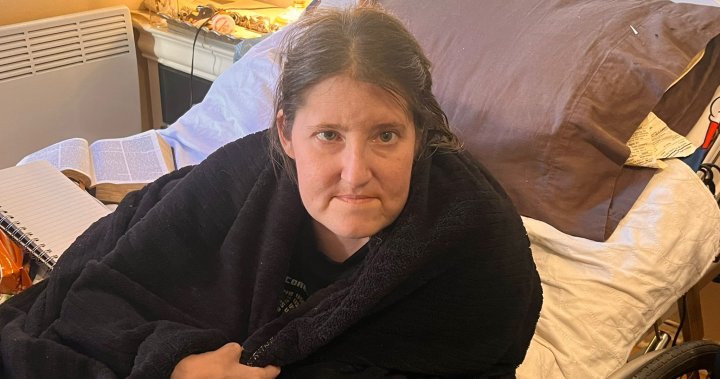The plight of a disabled woman on Montreal’s South Shore is an ominous example of the effects of the housing crisis on the most vulnerable.
Anne Marie Jobin, 45, is having trouble paying for both rent and her basic needs. She is desperate to get into social housing but has run into multiple barriers.
Born with spina bifada, Jobin is paralyzed from the waist down. She is essentially bedridden in her grim Greenfield Park apartment.
“I’ve been through hell in the last four years, to be honest with you,” she said in an interview.
Jobin says earlier this year her landlord increased her rent from around $800 per month to about $1,000 per month, and that she never received notice because she was in hospital at the time.
She is on welfare and says she now can’t make ends meet.
“It’s either ‘Do I eat this month?’ or ‘Do I pay the bills this month?’” she said.
Jobin says in July, she mistakenly signed a letter from her landlord agreeing to vacate the unit by Nov. 1.
“I was probably not aware at the time of what I was signing or I didn’t understand it,” she said.

Jobin’s mother, who lived a few doors down from her, died last year. Her father is doing his best to help, but is also battling health issues.
“She is hopeless, helpless, hopeless. She doesn’t know what to do and she’s afraid,” René Jobin said.
Jobin says her social worker has been trying to get her a spot in social housing to no avail.
“He has knocked on every door and there’s nothing open,” she said.
Housing rights advocate Cedric Dussault says she is far from alone.
“In Quebec in general, there are over 40,000 people who are on a waiting list for social housing,” said Dussault, who speaks for the Coalition of Housing Committees and Tenants Associations of Quebec.
Dussault said many vulnerable tenants who don’t know their rights sign documents without being aware of the consequences.
“Never sign something right on the spot when you’re not sure what you’re agreeing to,” he said. “There’s a lot of people who are misinformed about their own rights and face pressures from their landlords.”
He says it’s been decades since governments have made meaningful investments in social housing
“A quarter of homeless people right now are in the streets because they have been evicted from their dwelling,” he said.

Jobin’s landlord Zev Lowy of YK Realties told Global News over the phone that the higher rent she’s been paying in recent months was part of an agreed-upon payment plan after she missed a rent payment earlier this year.
Lowy claims the social worker was the one who asked for her lease to be broken, thinking a more suitable place for her could be found within three months, but that didn’t happen.
The CISSS de la Montérégie-Centre declined Global’s request to speak to Jobin’s social worker, citing confidentiality. Spokesperson Martine Lesage said the organization does indeed accompany home care recipients as they search for a place to live.
“I’m not the only person in this situation. The housing situation is terrible at this point,” Jobin said.
For now, Jobin is still in her apartment. The landlord told Global News he’s willing to give her an extension, and does not want to evict her without her having another place to go.
© 2023 Global News, a division of Corus Entertainment Inc.


